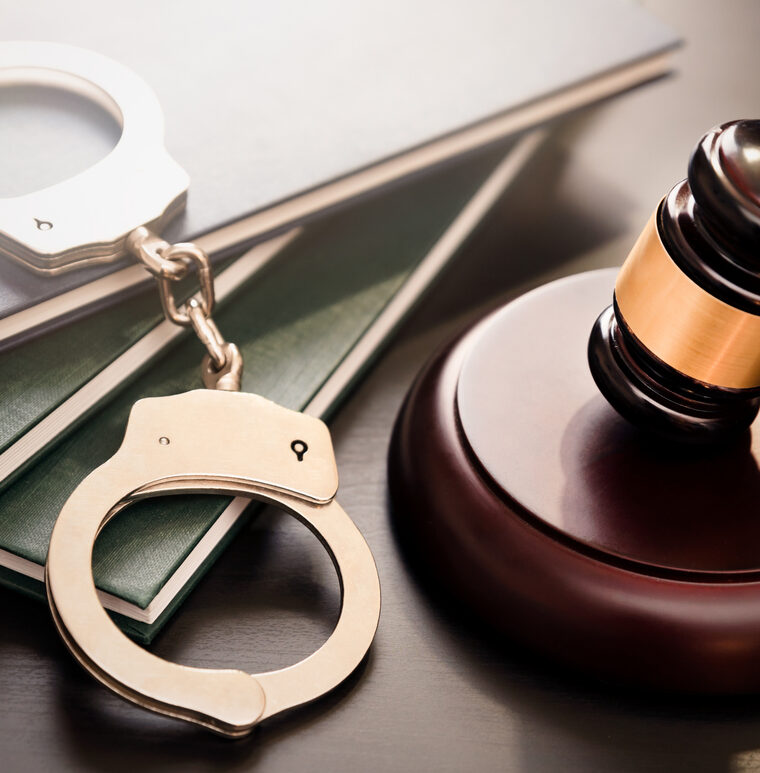
20+
years of experience

100+
5-star reviews

100%
criminal defense
Larceny is a crime that involves taking personal property belonging to someone else without intending to return it. In North Carolina, most theft crimes are classified as larceny.
Depending on the value of the property stolen, larceny can be either a misdemeanor or felony charge. Because penalties can include significant fines and lengthy jail or prison sentences, you should retain an experienced criminal lawyer as soon as possible if you are being investigated or have been arrested and charged with this crime.
The North Carolina larceny lawyers at Hiltzheimer Law Office are prepared to defend you against any larceny charge. We take the time to get to know you and the circumstances of your case. That attention to detail allows us to craft a strong and personalized defense on your behalf. Contact us now to get started with a consultation.
What Constitutes a Larceny NCGS § 14-72 Charge in North Carolina?
NCGS § 14-72 is a section of North Carolina criminal code that covers larceny, receiving stolen goods, and possessing stolen goods. Larceny covers many kinds of theft. In order for a person to be charged, law enforcement must have probable cause to establish key elements of larceny in North Carolina, which include the following:
- You took someone else’s property
- You knew the property was not yours
- You stole the property without the owner’s consent
- You intended to permanently deprive the owner of their property
- You carried the property from its location, even if this was just a short distance
The crimes of receiving stolen goods and possessing stolen goods are related to larceny charges. The charges differ, but the potential penalties are similar. For example, if someone steals property worth more than $1,000, they’ll face felony larceny charges, a Class H felony. You can also be charged with a Class H felony if you receive or possess that property and knew or reasonably should have known it was stolen.

Types of North Carolina Larceny Crimes
Under North Carolina criminal laws, there are two broad categories of criminal charges for larceny: Misdemeanor and felony larceny. Shoplifting is a related charge that falls under its own category.
Misdemeanor Larceny Charges
Typically, if the stolen property involved has a total value of $1,000 or less, you can be charged with misdemeanor larceny (also called petty larceny or petit larceny). This crime is a Class 1 misdemeanor.
Felony Larceny Charges
You can face felony larceny (also called grand larceny) charges if you are accused of stealing property worth more than $1,000. Under North Carolina larceny laws, this is a Class H felony. However, there are some cases, including the following, in which larceny is automatically a felony charge regardless of the stolen property’s value when you are accused of the following:
- Taking property directly from a person
- Removing or deactivating an anti-theft device in a retail store
- Obtaining the property by breaking and entering
- Stealing property that is a firearm or an explosive
- Stealing property that is a record in the North Carolina State Archives
- Committing larceny while having four or more previous larceny convictions
- Stealing a catalytic converter
- Stealing any car part where the cost of repairing the car is $1,000 or more
- Stealing a dog
- Stealing company merchandise as an employee or steal from an organization as someone in a position of trust
It’s important to note that you can also be charged with a felony if you simply possess stolen property. For example, if your friend steals a gun that you’re later found to be in possession of, you could be charged with felony possession of stolen property.
Shoplifting
The crime of shoplifting under North Carolina law comes under NCGS § 14-72.1(a), which covers concealment of merchandise in commercial establishments. In order to be convicted of shoplifting, the prosecution must prove that you concealed merchandise at a store, without having purchased that item, while still remaining on the premises. The state does not have to prove that you left the store, or even intended to leave the store, but only that you concealed the item without having purchased it.
Under NCGS § 14-72.1(d), you can also be charged with shoplifting for transferring a lower price tag from one item to another, otherwise by changing the price on an item in order to purchase it at a lower price.
Penalties for Larceny Convictions
If you have a misdemeanor or felony conviction for larceny, you’re likely wondering what penalties you may be facing. Your larceny sentence will depend on whether you were convicted on misdemeanor or felony larceny charges. If you’re convicted of misdemeanor larceny, you could face probation or be sentenced to up to 120 days in jail and a fine of up to $1,000, depending on your record and other factors.
However, many courts will try to avoid incarcerating people for minor theft crimes, especially if your larceny conviction is a first offense. You may be offered community service or probation instead of a jail sentence if you are convicted of misdemeanor larceny and have no prior criminal record.
If you are convicted of a felony larceny charge, the presumptive sentence is five to six months in prison. Felony sentencing in North Carolina is complex, though, and multiple factors can play a role in it. It could be determined by elements like the value of the property stolen, the criminal history of the person convicted, and other details specific to your case.
The maximum sentence for felony charges for larceny is 39 months in prison. Because of the complexities in the larceny laws of North Carolina, it’s absolutely essential that you consult a criminal defense attorney as soon as possible after your citation or arrest.
Shoplifting vs. “Concealment”
In North Carolina, the shoplifting statute defines the crime of shoplifting as “concealment” of goods while remaining on the premises of a retail establishment. In other words, you don’t have to leave the store — or even attempt to leave, or intend to leave — to be charged with shoplifting. That means that you could, in theory, be charged with shoplifting under North Carolina law by placing groceries into your own reusable bag in your cart — even when you fully intend to pay for everything at checkout — because you “concealed” items in a bag while remaining on the premises of the store. Clearly the legislature crafted the language of the shoplifting statute to make it very easy for stores to prosecute these cases, even when the accused may be entirely innocent of any unlawful intent.

Transferring of Price Tags
Transferring of a price tag from one item to another in order to receive a discounted price is also a criminal offense under the shoplifting law in North Carolina. Similarly, altering the price marking (for example, with a pen, or by applying your own price tag) will trigger the same criminal charge.
Use of Lead- or Aluminum-Lined Material to Conceal
The above-referenced offenses are all classified as misdemeanors in North Carolina, but if you are alleged to have used a lead-lined or aluminum-lined item — for example a bag, or a pocket — to prevent anti-theft security devices from triggering an alarm, you will be charged with a Class H felony.
Here is the relevant NC code governing the range of shoplifting charges described above:
- § 14-72.1. Concealment of merchandise in mercantile establishments.
- Willfully concealing merchandise within a store.
- First offense, Class 3 misdemeanor. Mandatory 24 hours community service if jail sentence is suspended.
- Second offense within three years, Class 2 misdemeanor. Mandatory 72 hours community service if jail sentence is suspended.
- Third or subsequent offense within five years, Class 1 misdemeanor.
- Use of lead or aluminum bag, pocket, or “similar” device to prevent activation of anti-theft device, Class H felony.
- Willfully concealing merchandise within a store.
Penalties for Felony Theft Crimes
Certain theft crimes are charged as felonies in North Carolina. Felony theft charges include shoplifting when it is alleged that an anti-theft or other security device was tampered with in the commission of the alleged theft when force is used to take items from another individual, and when the value of the alleged items exceeds a certain amount.

Embezzlement
Embezzlement is a separate category of theft in North Carolina that relates to the relationship of the individual accused of the theft to the alleged victim. For example, theft by a trustee from a fund, or theft of state property by a state official. Anyone in such a position who embezzles goods or property may face felony criminal charges, with a range of potential penalties depending on the value of the money or property and the specific relationship. Some of the specific crimes classified under the North Carolina code are as follows:
- § 14-90. Trustees, fiduciaries, others exercising a public trust. If the value of the embezzled money/property is $100,000 or more, a Class C felony. If under $100,000, a Class H felony.
- § 14-91. Public employees, including city and state government workers, and public officials, embezzling state property. If the value of what was embezzled is $100,000 or more, a Class C felony. If under $100, 000, a Class F felony.
- § 14-92. Public officers and trustees. If the value of what was embezzled is $100,000 or more, a Class C felony. If under $100, 000, a Class F felony.
- § 14-93. Treasurers of charitable and religious organizations. If the value of the embezzled money/property is $100,000 or more, a Class C felony. If under $100,000, a Class H felony.
- § 14-94. Officers of railroad companies. If the value of the embezzled money/property is $100,000 or more, a Class C felony. If under $100,000, a Class H felony.
- § 14-97. Appropriation of partnership funds by partner to personal use. If the value of the embezzled money/property is $100,000 or more, a Class C felony. If under $100,000, a Class H felony.
- § 14-98. Embezzlement by surviving partner. If the value of the embezzled money/property is $100,000 or more, a Class C felony. If under $100,000, a Class H felony.
- § 14-99. Embezzlement of taxes by officers. If the value of what was embezzled is $100,000 or more, a Class C felony. If under $100, 000, a Class F felony.
Larceny by Employee
“Larceny by Employee” is treated as a separate offense from embezzlement in North Carolina, though there can be overlap between the charges as defined in the North Carolina code. The penalties are very similar, but the state legislature decided to carve out two separate offenses. The potential penalties are as follows:
- § 14-74. Larceny by employee. If the value of what was embezzled is $100,000 or more, a Class C felony. If under $100,000, a Class H felony.
Potential Defenses to Shoplifting Charges
While the shoplifting statute in North Carolina does not require “criminal intent,” it does require willfulness with respect to the concealment of the goods in question. A potential defense may be that you placed an item into a stroller, or purse, or reusable shopping bag without the actual intent to conceal. Such inadvertent actions happen every day, but in North Carolina, you could be prosecuted for an entirely innocent act. The State, however, has the burden of proof in a criminal trial, and if we can persuade the judge that the State has failed to establish the willfulness of the concealment in a shoplifting case, the court would be required by law to return a verdict of Not Guilty. There may be other defenses available, depending on the specific facts of your case.

Protecting Your Rights
If you are charged with shoplifting, or any criminal charge, you have the right to remain silent, and in almost every scenario it is in your interest to take advantage of that right. In no case should you confess to committing any criminal act without an attorney present and without the advice of that attorney. If you invoke your right to remain silent, as opposed to “coming clean” to the authorities on the scene, you will give the State one less piece of evidence to use against you in the prosecution of your case. And if you retain an experienced trial lawyer from Hiltzheimer Law Office, we will meticulously evaluate your case for every possible defense.
Deferred Prosecution
If you are charged with a theft charge, shoplifting, or otherwise, in North Carolina, and you have no prior criminal record, you may be eligible for a deferred prosecution agreement. Hiltzheimer Law Office has successfully negotiated deferred prosecution agreements for numerous clients in a wide range of misdemeanor and felony cases. If you are fortunate enough to be accepted into a deferred prosecution agreement, and you successfully complete the terms, your case will be dismissed in its entirety upon completion of the program — typically community service, a probationary period, and restitution in some circumstances.
Expungement of Shoplifting Charges
Many people mistakenly believe that if their shoplifting or other theft charge is dismissed, their record is clean. But if an employer, school, or government agency runs a comprehensive criminal record check, they will be able to see that you were charged with a crime. While it may seem unfair, some employers will decline to hire an individual just because he or she was previously charged with a crime. As a result, you may want to consider petitioning the court for an expungement, if you are eligible, which effectively wipes your record clean after securing a dismissal of the charge.
Next Steps After Receiving Larceny Charges
If you’ve just been arrested and charged with misdemeanor or felony larceny, don’t panic. While being charged with a criminal offense may be a terrifying experience, the criminal defense attorneys at Hiltzheimer Law Office help people like you navigate theft crimes and other criminal charges on a daily basis.
If you are arrested, the best thing you can do for yourself is to reach out to experienced attorneys for larceny in North Carolina. Even if you think you’ll certainly be found guilty, don’t give up. Defense lawyers can analyze the evidence in your case, and also get to know you and your backstory in order to make a compassionate argument to the district attorney for leniency with respect to the prosecution of your case.
Contact Us Now
FAQ
In some cases, it may be possible to have your charges dropped. However, the likelihood of this happening depends on many factors. You should talk to a larceny lawyer in North Carolina as soon as possible to determine the options you have.
Is larceny a felony? In North Carolina, whether larceny is a misdemeanor or a felony often depends on the value of the stolen goods. Property valued at $1,000 or less typically leads to a misdemeanor charge, whereas property worth over $1,000 usually leads to a felony larceny charge. However, in some cases (like if you steal a firearm), the crime is a felony regardless of property value.
Larceny sentences in North Carolina can vary dramatically. The maximum sentence for grand larceny is 39 months in prison, but active jail sentences usually fall between four months and two years. Many people convicted of larceny crimes are eligible for probation. Several factors, including your criminal history and the circumstances of the crime, determine the sentence length. An experienced criminal defense attorney may be able to successfully negotiate lower penalties, or in a best case scenario, a deferral or conditional discharge that results in a complete dismissal of your charges.
Usually, you must steal property with a total value of more than $1,000 to be charged with felony larceny. However, there are some cases — like stealing from your employer or stealing a firearm — that are automatically felonies.

Contact Us Today
Get your free consultation.

Call or Text: (919) 899-9404

Durham Office:
331 W Main St #604 Durham, NC 27701

Raleigh Office:
19 W Hargett St #508 Raleigh, NC 27601

Chapel Hill Office:
605 W Main St #206E, Carrboro, NC 27510

